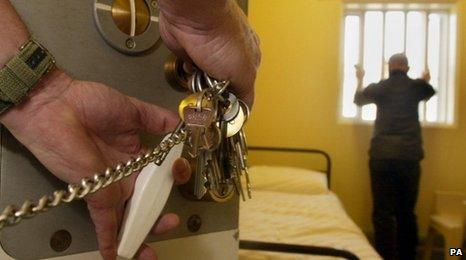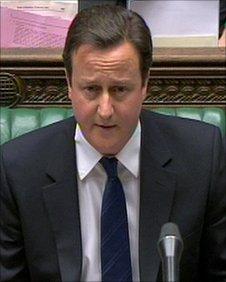MPs debate: Should prisoners have the right to vote?
- Published

The government's been told it is "unlawful" to deny prisoners the vote
MPs are voting on whether some prisoners should be allowed to vote.
It comes several years after the European Court of Human Rights called a ban on inmate voting "unlawful".
The Prime Minister David Cameron says the idea makes him feel "physically ill".
But he also says he may have no choice but to follow the Court's instructions.
Why is prisoner voting an issue?

David Cameron says the idea of prisoner voting makes him feel "physically ill"
Seven years ago, a convicted killer called John Hirst successfully argued in the European Court of Human Rights that it was wrong to prevent him from voting.
His case led to a ruling that a blanket-ban on prisoner voting is unacceptable - and that the UK must change its law.
Now, the Government says it will have to make the change - so it isn't forced to pay tens of millions of pounds in compensation to prisoners.
It's led to anger - particularly from a number of Conservative MPs - for two main reasons:
They believe strongly that you should forfeit the right to vote if you commit a crime serious enough to be sent to jail
They don't like being told what to do by what David Cameron recently called "unelected bureaucrats" in the French city of Strasbourg.
What are the arguments in favour of prisoner voting?
There is no evidence that preventing someone from voting cuts crime, according to the European Court of Human Rights.
John Hirst, the convicted killer who took his case to Strasbourg, said at the time: "What you forfeit when you go to jail is your liberty. You can't pop down the pub for a pint, you can't have sex with your loved one."
He went on: "That is what you're actually forfeiting - not the vote."
What is being proposed instead?
One suggestion is that the government should give the vote to prisoners who are serving less than 4 years behind bars.
The Government has spoken repeatedly of doing "the minimum necessary" to comply with the European ruling.
Nothing will change as a result of today's vote. The government says it's just a chance for MPs to debate the issues and have their say.
But MPs opposed to giving prisoners the vote say they want to show their leaders how angry they are - and to encourage the Government to make a stand against the European ruling.
Why does this European Court get a say?
The European Court of Human Rights was set up in Strasbourg in 1959.
It gives a final right of appeal for those who feel their human rights have been infringed.
There are 47 states signed up to it - including the United Kingdom.
It is separate from the European Union.
What's the situation elsewhere?
Other European countries with an outright ban on prisoner voting are Russia, Armenia, Bulgaria, Czech Republic, Estonia, Hungary, Luxembourg and Romania.
There's no ban in Albania, Ukraine or fourteen other countries - through there are practical difficulties that prevent prisoner voting in some.
The Republic of Ireland lifted its ban in 2006.
Who else is banned from voting in the UK ?
The vote is also denied to people convicted of corrupt or illegal election practices - and patients who are in psychiatric hospitals because of their crimes.
You can still vote if you are only in prison on remand.